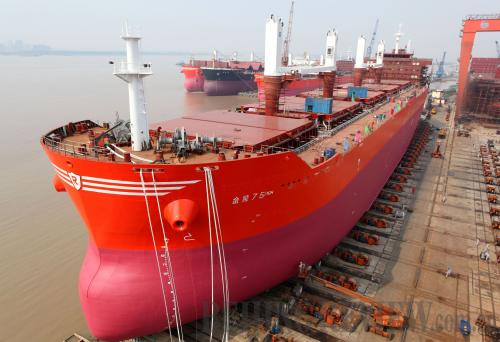|
 |
|
ADDING WEIGHT: A cargo ship in Nanjing, capital of Jiangsu Province, waits to set sail. China's ship makers received new orders of 75.23 million deadweight tons in 2010, said the Ministry of Industry and Information Technology (LI WENBAO) |
Numbers of the Week
4.19 trillion kwh
China's power consumption totaled 4.19 trillion kilowatt hours in 2010, surging 14.56 percent from a year ago, said the China Electricity Council.
166.25 billion yuan
China's lottery sales in 2010 rose 25.5 percent year on year to 166.25 billion yuan ($25.6 billion), said the Ministry of Finance.
TO THE POINT: By ordering another hike of the reserve requirement ratio, China is sparing no effort to dampen inflation. The central bank starts a trial currency program, under which qualified Chinese companies can settle their overseas direct investments in Chinese currency, the yuan. China remains the largest foreign holder of U.S. Treasury securities, even after shedding $11.2 billion in November 2010. State-owned enterprises reap handsome profits, drawing strength from the buoyant economy. China has become the country with the most installed wind power capacity worldwide. Due to the possibility of a sluggish auto market starting this year, private automaker BYD plans to cut its dealership in 2011.
By HU YUE
Soaking Up Liquidity
The People's Bank of China, the central bank, on January 20 increased the reserve requirement ratio for banks in a move to siphon excess liquidity out of the market, a trigger for runaway inflation. It was the first hike this year after six increases in 2010.
Commercial banks will have to set aside an additional 0.5 percent of their deposits in reserve, locking about 350 billion yuan ($52.7 billion) they could otherwise lend.
A flood of low-interest credit has found its way into the economy, forcing up prices across the country, including consumer goods and properties. The broad money supply (M2), which covers cash in circulation and all deposits, had stood at 72.58 trillion yuan ($11 trillion) by the end of 2010, up 19.7 percent year on year, topping the government's target of 17 percent.
In the wake of proliferating inflationary fears, China has vowed to take a prudent monetary stance this year, marking a switch from the moderately loose policy adopted to counter the financial crisis. Last year, the central bank also raised interest rates twice and drained liquidity through a series of market operations.
Since issuing central bank bills has turned out to be less effective, more reserve requirement rate increases are probably in the pipeline, said Wu Shijin, an analyst with the Guoxin Securities Co. Ltd.
Lian Ping, an economist with the Shanghai-based Bank of Communications, expected more interest rate hikes around the Spring Festival, which falls on February 3.
"The one-year deposit rate remains negative in real terms given soaring inflation," he said. "But a drastic increase is less likely as a large gap in rates with the United States would attract torrential inflows of speculative hot money."
Yuan's Global Reach
The central bank launched a trial program to allow qualified enterprises to settle their overseas direct investments in the yuan, or renminbi, a move expected to extend the Chinese currency's global reach and ease excess domestic liquidity.
In a notice issued on January 13, the central bank said businesses that were allowed to settle cross-border trade in the yuan would also be permitted to conduct direct investments, including mergers and acquisitions, outside China using the yuan.
In July 2009, China started a pilot scheme to promote yuan settlement in cross-border trade in five cities, and widened the program to cover 20 provinces and municipalities in June 2010.
Further, domestic banks could offer those enterprises loans for their overseas investment, and their investment profits could be remitted back to China in the yuan, according to the new rules that took effect on January 6.
The program is intended to push forward internationalization of the yuan and provide better support for Chinese enterprises expanding globally, said the central bank.
The move would provide a channel for domestic capital to flow out, taking inflationary pressures off the country, said Guo Tianyong, Director of the Research Center of China's Banking Industry at the Central University of Finance and Economics.
Meanwhile, it is bound to smooth the way for Chinese companies to venture abroad and help them avert foreign exchange risks, said Liu Dongliang, a senior analyst at the China Merchants Bank.
With deep pockets at their disposal, expansion-minded Chinese firms are quickening the pace of establishing a cross-border presence. Overcapacity at home and a stronger yuan are also forces pushing Chinese capital offshore.
But it remains to be seen how the program will work as many foreign companies may be reluctant to accept the yuan, he said.
Offloading U.S. Assets
China trimmed its holdings in U.S. Treasury securities by $11.2 billion to $895.6 billion in November 2010, said the U.S. Department of Treasury. This is the first reduction after four consecutive months of increases.
China remains the largest foreign holder of U.S. Treasury securities, ahead of Japan, which increased its holdings by $2.2 billion in November to $877.2 billion. Total holdings of Treasury securities by all foreign countries amounted to $4.35 trillion, an increase of 0.9 percent from the previous month. This was widely considered a sign that other nations still have an appetite for dollar assets.
Profitable SOEs
China's state-owned enterprises (SOEs) generated juicy profits in 2010, basking in the glow of a robust economy.
| 